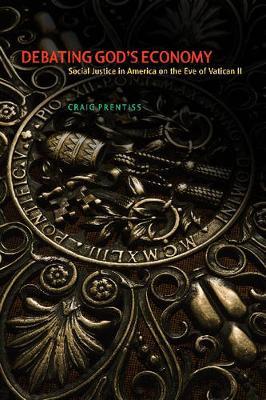Overview
What would a divinely ordained social order look like? Pre-Vatican II Catholics, from archbishops and theologians to Catholic union workers and laborers on U.S. farms, argued repeatedly about this in the late nineteenth and early twentieth centuries. Debating God's Economy is a history of American Catholic economic debates taking place during the generation preceding Vatican II. At that time, American society was rife with sociopolitical debates over the relative merits and dangers of Marxism, capitalism, and socialism; labor unions, class consciousness, and economic power were the watchwords of the day. This was a time of immense social change, and, especially in the light of the monumental social and economic upheavals in Russia and Europe in the early twentieth century, Catholics found themselves taking sides. Catholic subcultures across America sought to legitimize-or, in theological parlance, ""sanctify""-diverse economic systems that were, at times, mutually exclusive. While until now the faithful-both scholars and nonscholars-have typically spoken of ""the Catholic Social Tradition"" as if it were an established prescription for curing social ills, Prentiss maintains that the tradition is better understood as a debate grounded in a common mythology that provides Catholics with a distinctive vocabulary and touchstone of authority.
Full Product Details
Author: Craig Prentiss (Rockhurst University)
Publisher: Pennsylvania State University Press
Imprint: Pennsylvania State University Press
Dimensions:
Width: 15.20cm
, Height: 2.00cm
, Length: 22.90cm
Weight: 0.540kg
ISBN: 9780271033419
ISBN 10: 027103341
Pages: 280
Publication Date: 30 May 2008
Audience:
College/higher education
,
Professional and scholarly
,
Undergraduate
,
Postgraduate, Research & Scholarly
Format: Hardback
Publisher's Status: Active
Availability: Out of stock

The supplier is temporarily out of stock of this item. It will be ordered for you on backorder and shipped when it becomes available.
Reviews
Prentiss has written a solid and insightful study of the topic that deserves to be incorporated into the history of what has been called 'the Church's best-kept secret': Catholic social teaching. . . . The critical distance maintained with the aid of an overall approach from religious studies is on balance a great boon to historical understanding. --Paul Misner, Catholic Books Review
This book presents an excellent history, much of it from original sources, of some of the main institutional dialogues or approaches from this time. Those in search of a readable, balanced history of this lively era of American Catholic life could hardly do better than this book. </p>--Paul Sullins, <em>Journal of Religion</em></p>
This book presents an excellent history, much of it from original sources, of some of the main institutional dialogues or approaches from this time. Those in search of a readable, balanced history of this lively era of American Catholic life could hardly do better than this book. -Paul Sullins, Journal of Religion Prentiss has written a solid and insightful study of the topic that deserves to be incorporated into the history of what has been called 'the Church's best-kept secret': Catholic social teaching. . . . The critical distance maintained with the aid of an overall approach from religious studies is on balance a great boon to historical understanding. -Paul Misner, Catholic Books Review This is a skillfully contextualized, intelligent, and empathetic study of the authors, activists, and social scientists on all sides of the debate that rocked the American Catholic Church between the Depression and Vatican II. It raises new and fruitful questions about the nature and workings of the American Catholic community on the eve of Vatican II. -D. Campbell, Choice
This book presents an excellent history, much of it from original sources, of some of the main institutional dialogues or approaches from this time. Those in search of a readable, balanced history of this lively era of American Catholic life could hardly do better than this book. --Paul Sullins, Journal of Religion This is a skillfully contextualized, intelligent, and empathetic study of the authors, activists, and social scientists on all sides of the debate that rocked the American Catholic Church between the Depression and Vatican II. It raises new and fruitful questions about the nature and workings of the American Catholic community on the eve of Vatican II. --D. Campbell, Choice Prentiss has written a solid and insightful study of the topic that deserves to be incorporated into the history of what has been called 'the Church's best-kept secret': Catholic social teaching. . . . The critical distance maintained with the aid of an overall approach from religious studies is on balance a great boon to historical understanding. --Paul Misner, Catholic Books Review
Author Information
Craig Prentiss is Associate Professor of Theology and Religious Studies at Rockhurst University in Kansas City, Missouri, and editor of Religion and the Creation of Race and Ethnicity: An Introduction (2003).



